Thoreau's Legacy (2 page)
Authors: Richard Hayes
Introduction
Elda Rotor and Kevin Knobloch
IN THE FALL OF 2008, PENGUIN CLASSICS AND THE Union of Concerned Scientists, with the help of hundreds of bookstores across the country, called for interested citizens to submit their personal stories about global warming for a new anthology. The response to our call was overwhelming, making clear how global warming is affecting people’s lives and the places they cherish, as well as the steps they are taking to address the problem.
The essays we selected represent a variety of perspectives, voices, and experiences. The writers include scientists, students, grandparents, activists, veterans, journalists, evangelical Christians, artists, and businesspeople. Their muses are as diverse as their backgrounds.
The chapters are loosely organized by theme. After this introduction, we decided to let the authors’ words speak for themselves. We thought it fitting that the first two essays pay tribute to the namesake of this volume, Henry David Thoreau. Thoreau was a writer of uncommon power and a keen observer and recorder of his environment; he seemed to us to be an appropriate figure to represent a partnership between a science-based nonprofit organization and a publisher of literary classics, for he was, in a sense, a kind of literary scientist.
More than 150 years after the publication of
Walden,
Thoreau still calls us to meditate on our own lives and to pay close attention to the natural world and what we can learn from it. In
Walden
and his other works, Thoreau inspired a long line of great American environmental champions and writers, such as John Muir, Aldo Leopold, and Rachel Carson, who introduced readers to landscapes and their indigenous inhabitants—creatures with as much heroism, villainy, grace, and beauty as the great human characters of classic literature. There are too many outstanding works to note here, but we each have our favorites. For Elda it is Rachel Carson’s
Under the Sea-Wind
, with its breathtaking and scenic, humble and majestic observations of the natural world of the air, the land, and the oceans. For Kevin it is Don Schueler’s
A Handmade Wilderness
, a moving account of two friends who buy a worn-out piece of land in Mississippi and restore it to beauty, health, and usefulness.
There may be no better current example of Thoreau’s legacy than Barbara Kingsolver. Every sentence she writes crackles with energy, and her foreword to this collection is a powerful call to actively combat climate change. Indeed, the science shows that we need to act now if we are to have any hope of stopping the worst consequences of global warming.
Our organizations are proud to bring you this exceptional group of thoughtful and inspiring personal stories about global warming. The authors follow in the long tradition of American environmental writers who have broadened our awareness and sharpened our perspective about the world we share.
They are Thoreau’s legacy.
Elda Rotor
Editorial Director
Penguin Classics
Kevin Knobloch
President
Union of Concerned Scientists
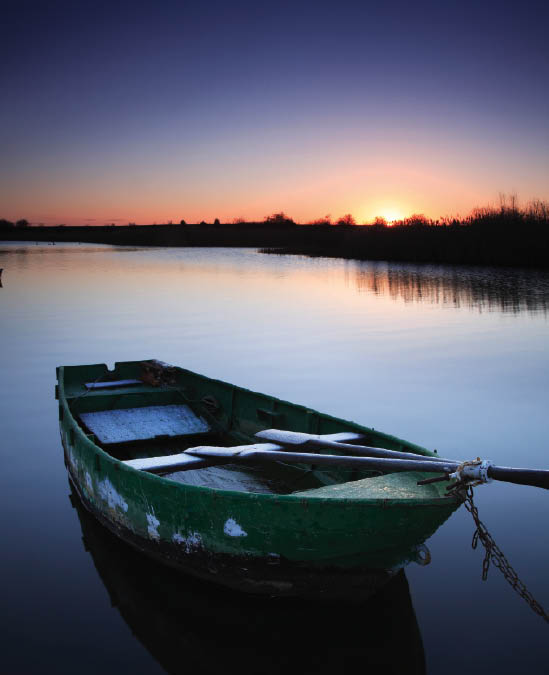
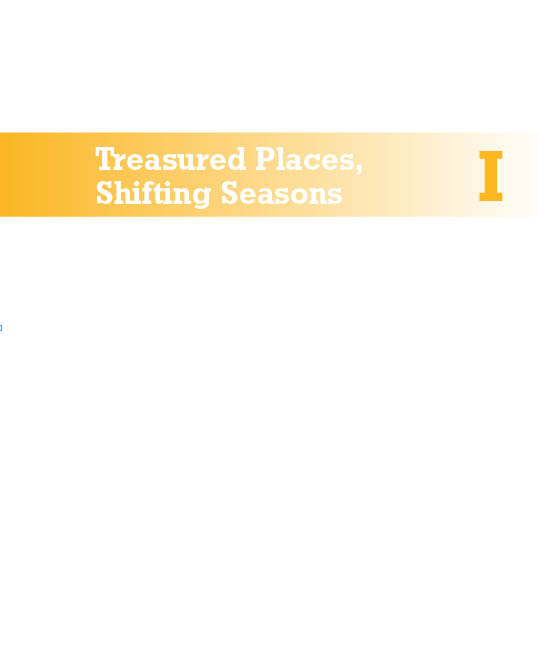
The Warming
of Walden
Michelle Nijhuis
I KNEW CLIMATE CHANGE HAD NO BOUNDARIES; AS a science journalist, I’d seen the fingerprints of global warming in Yosemite and Yellowstone national parks and in the highest peaks of the Rocky Mountains. Even so, I didn’t expect to see its effects on the shores of Walden Pond.
One early spring day not long ago, I accompanied the Boston University biologists Abe Miller-Rushing and Richard Primack as they followed Henry Thoreau through the historic sites of Concord, Massachusetts. Thoreau, it turns out, was more than a prolific author, determined iconoclast, and legendary cheapskate: he was also an avid amateur botanist who walked miles in pursuit of the earliest blossoms, collecting specimens in his dilapidated straw hat. “I have the habit of attention to such excess,” he once complained, “that my senses get no rest, but suffer from a constant strain.”
With Thoreau’s detailed botanical records in hand, Miller-Rushing and Primack retraced the philosopher’s steps, noting how flowering times have changed since Thoreau roamed the woods a century and a half ago.
They took me botanizing through the
crowds of tourists
at Walden Pond
, on the train tracks near the site of Thoreau’s cabin, and even on the grassy slopes near his grave.
The scientists told me that, on average, spring flowers in Concord were blooming a full seven days earlier than in the 1850s and that their statistics showed a clear and close relationship between earlier flowering times and rising winter and spring temperatures. Thanks to Thoreau’s obsessive data collection—and their own efforts to decipher his crabbed handwriting and match his exploits in the field—they’d found that climate change had touched even the mythic American landscape of Concord.
Their discovery doesn’t cast much light on the path ahead. “Now that we know what’s changing, what are we going to do about it, and what are species going to do on their own about it?” reflected Miller-Rushing. “Those are unanswered questions.” But their work does show how deeply climate change has already penetrated our back yards—and how citizens, from the noted to the obscure, can help track its effects.
Primack and Miller-Rushing are still digging for data in unlikely places. They’ve collected the records of modern-day amateur naturalists and used them to study changes in bird migrations along the East Coast. They recently heard that the owner of Polly’s Pancake Parlor in New Hampshire has a three-decade-long record of the timing of fall foliage in the White Mountains. Bit by bit, scribble by scribble, they and their collaborators—living and dead—are assembling a picture of the past and the unsettling future. With each new finding, their most famous associate seems more prescient than ever: “My expectation ripens to discovery,” Thoreau wrote in his journal in 1856. “I am prepared for strange things.”
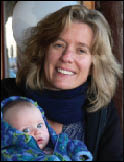
Michelle Nijhuis
is an award-winning science journalist and former biologist. She lives off the electrical grid in rural western Colorado with her husband and daughter.
Skinny-Dipping at Walden
Melissa M. Juchniewicz
FOR MOST AMERICANS, HENRY DAVID THOREAU IS A clear but distant voice. But growing up in Concord, Massachusetts, I had a very different perspective of my ancestral townsman. I picked blueberries in the same woods as Thoreau, wandered the same meadows, played in the same sweet, spring-fed waters of Walden and its sister, White Pond.
About a hundred years after
Walden
was written, Walden Pond had a public swimming beach with a snack bar and, across the street, a trailer park. On the shores of White Pond, which is connected to Walden by deep underground springs, were summer camps; some, like my family’s, were winterized and lived in year-round. My neighborhood was on the wrong side of the tracks, although I delighted in hearing the train whistle and running to those tracks to wave to the conductor.
That whistle was one of my favorite sounds. The other was the frogs.
I went to sleep on summer nights to the deafening
music of the bullfrogs.
In April I strained to hear the early peepers, signaling spring. The tree frogs’ songs were so unique, I felt that no one else in the world knew them as I did.
My best memories are of the woods and ponds. Walking the paths around the ponds, I would stop every few steps to look closely at a dragonfly, a fish, or a frog. The frogs were invisible until they blinked or hopped into the water, and they didn’t mind being petted between the eyes or held cupped in my hands for a closer look. When I was a teenager, my high-spirited friends and I would respond to spring fever by skipping school and following the paths to Walden. There we had the world to ourselves as we skinny-dipped and sunned on the rocks on the north side of the pond, across from the pile of rocks marking the spot where Thoreau had built his cabin. We heard the train on its way to Boston, the wind in the leaves, and the frogs.
Years later, when I visited my mother at White Pond, I was stunned by the silence. In that whole summer night, I didn’t hear a single frog. I miss my private world of woods, meadows, and ponds, which are now something of a theme park for those interested in Concord’s history. I don’t begrudge sharing my hometown with others, but when I learned what had happened to my frogs, I was horrified.
That delicate skin I used to pet allows the frogs to breathe, but it makes them more vulnerable to pollution, pesticides, and ultraviolet rays than any other group of animals. Scientists consider them an early-warning system: their vulnerable skin and fragile eggs mean that they will die from global warming before other groups. To me, frogs are more than a warning system. They represent the mysterious beauty of nature, the infinite curiosity of childhood, and the discovery of youthful freedom.
The loss of the frogs and what they represent is, to me, a boundless tragedy.
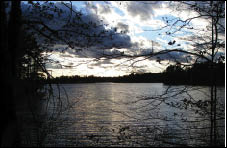
Walden Pond, once a secret, sacred place. Photo by Melissa M. Juchniewicz.
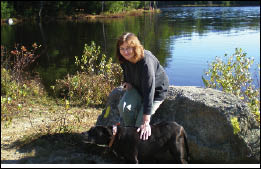
Melissa M. Juchniewicz
worked in the professional theater before becoming a teacher of language and education. She lives with her husband in an 1812 farmhouse in Chester, New Hampshire.